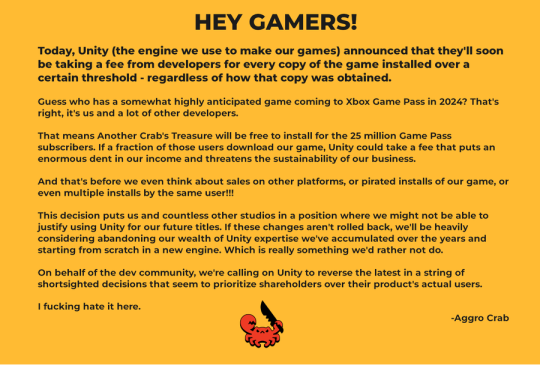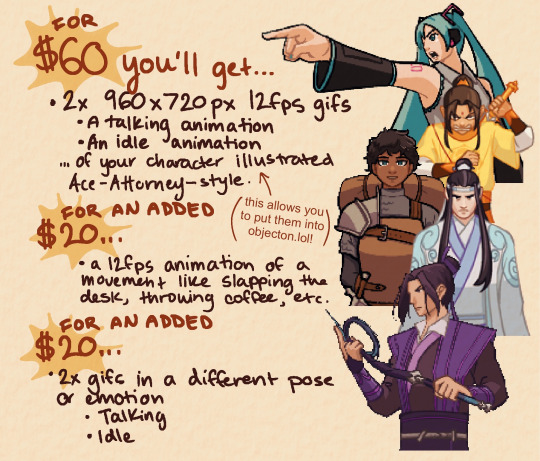#Ad-Based Monetization
Explore tagged Tumblr posts
Text

#Mobile App Monetization#App Revenue Models#In-App Purchases#Subscription-Based Apps#Ad-Based Monetization#Mobile App Strategy#App Developers#App Marketing#Mobile Business Growth#App Profits
1 note
·
View note
Text
did Pinterest fuck with their algorithm or smth? their suggestions used to have me by the throat but lately theyre shit
#pinterest is really the only algorithm based site i support even conceptually#actually now that im thinking about it the reason the way tumblr is going about updating this website sucks#is because theyre trying too hard to emulate twitter but tumblr and twitter are fundamentally different website genres#whereas pinterest is the only current Well Known analogue to tumblr#like. this is very much a Multi Media Blogging Platform with an undeniable and historic focus on visual media#twitter on the other hand is Thee Text Based Blogging Platform and has also been like. legitimized in the eyes of#the non-chronically online public.#i think there are plenty of ways they could more effectively monetize this website without so .... crudely altering the very essence of like#this websites spot in the web 2.0 canon.#i think discounting this websites foundational relationship to visual media - and by extension creativity focused communities -#is only going to alienate your userbase and create a contentious relationship between developer and user#and really what could elevate this websites foot traffic and therefore ad revenue#would be to differentiate itself as the Big Social Media Platform where the developers arent seen as like. evil overlords#like that is the hole in the internet that needs to be filled#if you read this entire essay in the tags ... girl why#anyhow#honestly?#staff#should hire me.
12 notes
·
View notes
Note
We know Ao3 doesn't have an app and yet they keep popping app. That makes me feel that people want it and get exploited by the fake ones.
There isn't a plan to make one but, have a PWA been considered?
Hey chaoticneutralchocolate -
The main reason that apps pop up for AO3 is not because fandom folks want it, so much as app-making-folks want to monetize fans accessing fanfiction. All those apps? they have ads. that make the developer money.
Currently, we do not have an API (application program interface), which is needed to allow an app to interact with our servers. Developing such an interface and then the apps themselves (for the various mobile platforms) would take significant time and coder effort. It’s unlikely to happen while the Archive code is still rapidly changing, as this would require the apps to be updated for each change. You can see more details at our news post on the subject: https://archiveofourown.org/admin_posts/3390 .
Even a browser-based app interface would be a tremendous amount of work that we do not have the staffing (or inclination) to establish or maintain.
In the meantime, you should be able to access the fully functional Archive using your device’s browser with our mobile stylesheet, and to download works to read offline with an e-reader app. You can also add a link to the site on your home screen ( https://www.howtogeek.com/196087/how-to-add-websites-to-the-home-screen-on-any-smartphone-or-tablet/ ) for quick access!
I should note that, due to fannish response, the app stores removed a number of unofficial apps in 2020. See the Fanlore page for more information: https://fanlore.org/wiki/AO3_App_Wars
(if you see an app out there claiming to be AO3 or using our logo, send a message to OTW Legal and let them know the name of the app so they can look into it!)
I hope this answers your question!
~ Mod Remi
#organization for transformative works#otw#archive of our own#ao3#we will never have an app folks#that is why we work so hard to have the mobile site work so well#and you can always download and use an e-reader!
2K notes
·
View notes
Text
So, let me try and put everything together here, because I really do think it needs to be talked about.
Today, Unity announced that it intends to apply a fee to use its software. Then it got worse.
For those not in the know, Unity is the most popular free to use video game development tool, offering a basic version for individuals who want to learn how to create games or create independently alongside paid versions for corporations or people who want more features. It's decent enough at this job, has issues but for the price point I can't complain, and is the idea entry point into creating in this medium, it's a very important piece of software.
But speaking of tools, the CEO is a massive one. When he was the COO of EA, he advocated for using, what out and out sounds like emotional manipulation to coerce players into microtransactions.
"A consumer gets engaged in a property, they might spend 10, 20, 30, 50 hours on the game and then when they're deep into the game they're well invested in it. We're not gouging, but we're charging and at that point in time the commitment can be pretty high."
He also called game developers who don't discuss monetization early in the planning stages of development, quote, "fucking idiots".
So that sets the stage for what might be one of the most bald-faced greediest moves I've seen from a corporation in a minute. Most at least have the sense of self-preservation to hide it.
A few hours ago, Unity posted this announcement on the official blog.
Effective January 1, 2024, we will introduce a new Unity Runtime Fee that’s based on game installs. We will also add cloud-based asset storage, Unity DevOps tools, and AI at runtime at no extra cost to Unity subscription plans this November. We are introducing a Unity Runtime Fee that is based upon each time a qualifying game is downloaded by an end user. We chose this because each time a game is downloaded, the Unity Runtime is also installed. Also we believe that an initial install-based fee allows creators to keep the ongoing financial gains from player engagement, unlike a revenue share.
Now there are a few red flags to note in this pitch immediately.
Unity is planning on charging a fee on all games which use its engine.
This is a flat fee per number of installs.
They are using an always online runtime function to determine whether a game is downloaded.
There is just so many things wrong with this that it's hard to know where to start, not helped by this FAQ which doubled down on a lot of the major issues people had.
I guess let's start with what people noticed first. Because it's using a system baked into the software itself, Unity would not be differentiating between a "purchase" and a "download". If someone uninstalls and reinstalls a game, that's two downloads. If someone gets a new computer or a new console and downloads a game already purchased from their account, that's two download. If someone pirates the game, the studio will be asked to pay for that download.
Q: How are you going to collect installs? A: We leverage our own proprietary data model. We believe it gives an accurate determination of the number of times the runtime is distributed for a given project. Q: Is software made in unity going to be calling home to unity whenever it's ran, even for enterprice licenses? A: We use a composite model for counting runtime installs that collects data from numerous sources. The Unity Runtime Fee will use data in compliance with GDPR and CCPA. The data being requested is aggregated and is being used for billing purposes. Q: If a user reinstalls/redownloads a game / changes their hardware, will that count as multiple installs? A: Yes. The creator will need to pay for all future installs. The reason is that Unity doesn’t receive end-player information, just aggregate data. Q: What's going to stop us being charged for pirated copies of our games? A: We do already have fraud detection practices in our Ads technology which is solving a similar problem, so we will leverage that know-how as a starting point. We recognize that users will have concerns about this and we will make available a process for them to submit their concerns to our fraud compliance team.
This is potentially related to a new system that will require Unity Personal developers to go online at least once every three days.
Starting in November, Unity Personal users will get a new sign-in and online user experience. Users will need to be signed into the Hub with their Unity ID and connect to the internet to use Unity. If the internet connection is lost, users can continue using Unity for up to 3 days while offline. More details to come, when this change takes effect.
It's unclear whether this requirement will be attached to any and all Unity games, though it would explain how they're theoretically able to track "the number of installs", and why the methodology for tracking these installs is so shit, as we'll discuss later.
Unity claims that it will only leverage this fee to games which surpass a certain threshold of downloads and yearly revenue.
Only games that meet the following thresholds qualify for the Unity Runtime Fee: Unity Personal and Unity Plus: Those that have made $200,000 USD or more in the last 12 months AND have at least 200,000 lifetime game installs. Unity Pro and Unity Enterprise: Those that have made $1,000,000 USD or more in the last 12 months AND have at least 1,000,000 lifetime game installs.
They don't say how they're going to collect information on a game's revenue, likely this is just to say that they're only interested in squeezing larger products (games like Genshin Impact and Honkai: Star Rail, Fate Grand Order, Among Us, and Fall Guys) and not every 2 dollar puzzle platformer that drops on Steam. But also, these larger products have the easiest time porting off of Unity and the most incentives to, meaning realistically those heaviest impacted are going to be the ones who just barely meet this threshold, most of them indie developers.
Aggro Crab Games, one of the first to properly break this story, points out that systems like the Xbox Game Pass, which is already pretty predatory towards smaller developers, will quickly inflate their "lifetime game installs" meaning even skimming the threshold of that 200k revenue, will be asked to pay a fee per install, not a percentage on said revenue.

[IMAGE DESCRIPTION: Hey Gamers!
Today, Unity (the engine we use to make our games) announced that they'll soon be taking a fee from developers for every copy of the game installed over a certain threshold - regardless of how that copy was obtained.
Guess who has a somewhat highly anticipated game coming to Xbox Game Pass in 2024? That's right, it's us and a lot of other developers.
That means Another Crab's Treasure will be free to install for the 25 million Game Pass subscribers. If a fraction of those users download our game, Unity could take a fee that puts an enormous dent in our income and threatens the sustainability of our business.
And that's before we even think about sales on other platforms, or pirated installs of our game, or even multiple installs by the same user!!!
This decision puts us and countless other studios in a position where we might not be able to justify using Unity for our future titles. If these changes aren't rolled back, we'll be heavily considering abandoning our wealth of Unity expertise we've accumulated over the years and starting from scratch in a new engine. Which is really something we'd rather not do.
On behalf of the dev community, we're calling on Unity to reverse the latest in a string of shortsighted decisions that seem to prioritize shareholders over their product's actual users.
I fucking hate it here.
-Aggro Crab - END DESCRIPTION]
That fee, by the way, is a flat fee. Not a percentage, not a royalty. This means that any games made in Unity expecting any kind of success are heavily incentivized to cost as much as possible.

[IMAGE DESCRIPTION: A table listing the various fees by number of Installs over the Install Threshold vs. version of Unity used, ranging from $0.01 to $0.20 per install. END DESCRIPTION]
Basic elementary school math tells us that if a game comes out for $1.99, they will be paying, at maximum, 10% of their revenue to Unity, whereas jacking the price up to $59.99 lowers that percentage to something closer to 0.3%. Obviously any company, especially any company in financial desperation, which a sudden anchor on all your revenue is going to create, is going to choose the latter.
Furthermore, and following the trend of "fuck anyone who doesn't ask for money", Unity helpfully defines what an install is on their main site.
While I'm looking at this page as it exists now, it currently says
The installation and initialization of a game or app on an end user’s device as well as distribution via streaming is considered an “install.” Games or apps with substantially similar content may be counted as one project, with installs then aggregated to calculate the Unity Runtime Fee.
However, I saw a screenshot saying something different, and utilizing the Wayback Machine we can see that this phrasing was changed at some point in the few hours since this announcement went up. Instead, it reads:
The installation and initialization of a game or app on an end user’s device as well as distribution via streaming or web browser is considered an “install.” Games or apps with substantially similar content may be counted as one project, with installs then aggregated to calculate the Unity Runtime Fee.
Screenshot for posterity:

That would mean web browser games made in Unity would count towards this install threshold. You could legitimately drive the count up simply by continuously refreshing the page. The FAQ, again, doubles down.
Q: Does this affect WebGL and streamed games? A: Games on all platforms are eligible for the fee but will only incur costs if both the install and revenue thresholds are crossed. Installs - which involves initialization of the runtime on a client device - are counted on all platforms the same way (WebGL and streaming included).
And, what I personally consider to be the most suspect claim in this entire debacle, they claim that "lifetime installs" includes installs prior to this change going into effect.
Will this fee apply to games using Unity Runtime that are already on the market on January 1, 2024? Yes, the fee applies to eligible games currently in market that continue to distribute the runtime. We look at a game's lifetime installs to determine eligibility for the runtime fee. Then we bill the runtime fee based on all new installs that occur after January 1, 2024.
Again, again, doubled down in the FAQ.
Q: Are these fees going to apply to games which have been out for years already? If you met the threshold 2 years ago, you'll start owing for any installs monthly from January, no? (in theory). It says they'll use previous installs to determine threshold eligibility & then you'll start owing them for the new ones. A: Yes, assuming the game is eligible and distributing the Unity Runtime then runtime fees will apply. We look at a game's lifetime installs to determine eligibility for the runtime fee. Then we bill the runtime fee based on all new installs that occur after January 1, 2024.
That would involve billing companies for using their software before telling them of the existence of a bill. Holding their actions to a contract that they performed before the contract existed!
Okay. I think that's everything. So far.
There is one thing that I want to mention before ending this post, unfortunately it's a little conspiratorial, but it's so hard to believe that anyone genuinely thought this was a good idea that it's stuck in my brain as a significant possibility.
A few days ago it was reported that Unity's CEO sold 2,000 shares of his own company.
On September 6, 2023, John Riccitiello, President and CEO of Unity Software Inc (NYSE:U), sold 2,000 shares of the company. This move is part of a larger trend for the insider, who over the past year has sold a total of 50,610 shares and purchased none.
I would not be surprised if this decision gets reversed tomorrow, that it was literally only made for the CEO to short his own goddamn company, because I would sooner believe that this whole thing is some idiotic attempt at committing fraud than a real monetization strategy, even knowing how unfathomably greedy these people can be.
So, with all that said, what do we do now?
Well, in all likelihood you won't need to do anything. As I said, some of the biggest names in the industry would be directly affected by this change, and you can bet your bottom dollar that they're not just going to take it lying down. After all, the only way to stop a greedy CEO is with a greedier CEO, right?
(I fucking hate it here.)
And that's not mentioning the indie devs who are already talking about abandoning the engine.
[Links display tweets from the lead developer of Among Us saying it'd be less costly to hire people to move the game off of Unity and Cult of the Lamb's official twitter saying the game won't be available after January 1st in response to the news.]
That being said, I'm still shaken by all this. The fact that Unity is openly willing to go back and punish its developers for ever having used the engine in the past makes me question my relationship to it.
The news has given rise to the visibility of free, open source alternative Godot, which, if you're interested, is likely a better option than Unity at this point. Mostly, though, I just hope we can get out of this whole, fucking, environment where creatives are treated as an endless mill of free profits that's going to be continuously ratcheted up and up to drive unsustainable infinite corporate growth that our entire economy is based on for some fuckin reason.
Anyways, that's that, I find having these big posts that break everything down to be helpful.
#Unity#Unity3D#Video Games#Game Development#Game Developers#fuckshit#I don't know what to tag news like this
6K notes
·
View notes
Text




I am now opening custom Ace Attorney sprite commissions!

I have 3 open slots.
Depending on how the initial slots go, I may or may not offer more. DMs also welcome.
>> Commission form! <<
Details
What exactly will you receive for $60?
Two 12fps looping .gif files in an Ace Attorney style, one talking and one idle, of the character of your choice from the waist up. They can be in pretty much any still position, but I get final say on whether something is too difficult or too complex. I will work to make the sprite as accurate as possible while adhering to the style.
What will you receive for $20?
Either a short 12fps animation of your character or another two looping gifs (talking and idling) in a different pose/emotion. An animation can be combined with talking. For example, this Wei Wuxian MDZS would be $80: $60 as a base price (standing still and talking) with $20 added for his hand gesture.

This set of Lan Wangji MDZSs would be $100: $60 (base price, neutral animation) + $20 (happy) + $20 (displeased).



What counts as a "slot"?
Art of one character, no matter how many pieces I was commissioned for.
For more examples of my Ace Attorney-style work, here is the masterpost for my MDZS x Ace Attorney crossover series, which I have been adding to for a while now. Here are Kabru, Miku, and Hela Vitrum (my most recent commission). They are a good example of the base commission -- a looped talking gif and a looped idle/blinking gif.
Policies (read this before filling out the form!)
I am not affiliated with objection.lol. The sprites *can* be used in the program to great success. However, I will not guide you through creating a case in objection.lol. There are a lot of tutorials available. I am selling animated illustrations of your character and nothing else.
I am not affiliated with Capcom or Ace Attorney. My work copies the style of original games. In many cases, I have referenced pre-existing animations or sprites.
Just in case, I'm limiting the max number of pieces for a single character to 3 poses and 1 animation ($120) (so I don't get bored drawing them over and over again). One person can commission me for multiple characters but they will count as different slots (i.e., you may commission the max amount of work for Blorbo Bingus ($120) and also commission two poses for Dworbo Dingus ($80) for a total of $200, counting as two slots).
It is my privilege to take or refuse commissions at my discretion.
Depending on demand, I may adopt a first-come first-served waitlist system, but I really can't know at this point.
Payment depends on the price of the commission, but in general I will not start the piece until I am paid via Paypal. Venmo is a secondary option. My prices are in USD.
Once I get started, I work quickly, so any changes should be requested at the sketch stage. I will work with you to get it right. Once I have started work a piece (once planning is finished) I will not give refunds. Finished piece(s) should be done within a month of finalization (you giving me the go-ahead to start).
Filling out the form does not mean I have accepted the commission, but it does mean that I will contact you in a routine way about it.
These commissions are intended for personal use. The pricing reflects that. Tell me if you wish to use a commission in a monetized way, as that will require renegotiation.
If you wish to communicate with me about commission work without filling out the form, my email is [email protected]. I am not planning to offer commissions other than Ace Attorney sprites at this time. I will reply within the week.
Communication via tumblr DMs, asks, or comments is welcome!
#art commissions#commissions open#open art commissions#art#my art#ace attorney#ace attorney fanart#animation#animation commissions#artists on tumblr#mdzs aa au
2K notes
·
View notes
Text
15 ways to diversify your income & take control of your financial future:
1. Start a side hustle
💻 Freelancing: Offer services like writing, graphic design or virtual assistance
📦 E-commerce: Sell products on platforms like Etsy, Shopify, Amazon
📸 Content creation: Monetize social media through brand partnerships or affiliate marketing
2. Invest in assets
🏡 Real estate: Buy rental properties or invest in REITs
📈 Stocks and bonds: Build a diversified investment portfolio
💎 Crypto or precious metals: Explore alternative investments
3. Create passive income
📚 Digital products: Write an eBook, create an online course or sell templates
🎥 YouTube channel: Earn through ad revenue, sponsorships, and memberships
📊 Affiliate marketing: Partner with brands to earn a commission on referrals
4. Start a business
👗 Product based business: Create and sell your own brand of beauty, fashion or wellness products
🛠️ Service based business: Start consulting, coaching, or offering niche services
5. Build Your personal brand
💼 Public speaking: Get paid for sharing your expertise
🎤 Podcasting: Monetize through sponsorships or exclusive content
6. Invest in education
📖 Upskill: Learn high demand skills that increase your earning potential
👩🏫 Teach: Offer paid workshops or mentoring programs
281 notes
·
View notes
Text
I just. I don’t really want to keep talking about it, but I have to get these feelings out because the more I think about Somerton’s excuses video the angrier I get, ESPECIALLY given his insistence in the video that there isn’t a real community within LGBTQ spaces—specifically this quote; “We wanted it to be a channel where every queer person could feel welcomed... And we failed at that. That is something that, in hindsight, I think is impossible to create.”*
Because wow! Aren’t you the one who called Becky Albertalli, a bisexual woman, straight ?? Aren’t you the one who has consistently stolen queer and lgbtq people’s work as your own , profiting off of their labor and research and time? Aren’t you the one who sicced your fan base on smaller creators who noticed your plagiarism??? Aren’t YOU the one who LIED blatantly about lesbians “historically having it easier” than gay men ?? That LIED about Radclyffe Hall’s book being banned and destroyed???? What was it you said?? That she got to go on with “her merry little life”???
Fuck you. How dare you.
How dare you say there is no community, no safe space for all of us, when you have literally done NOTHING but maliciously and consistently stolen from, lied to, manipulated, and put down and bullied the community.
You have done nothing but try to break apart and put down your lgbtq siblings, so of course you believe that solidarity, safety, and intersectionality within our community is not something that can exist.
There are lgbtq people who are actively working to make those spaces, where everyone feels welcomed, but you clearly see yourself as being above that, above collaboration and community, above listening to other’s experiences.
You only think that a space where all queer and lgbtq people are welcomed and feel safe is impossible because your goal was never to carve out that space. It was to make money and take advantage of the people who looked up to you.
You think it’s impossible because you never once thought about the people you were stealing from, never once cared about the community, our history, the activism of our elders and all they did, never thought about how your actions and lies would hurt the community.
Stop making excuses and lying. Be fucking better.
———————————————————————
*(Somerton, James. “A Measured Response.” YouTube, uploaded by James Somerton, 26 February 2024, https://m.youtube.com/watch?v=kCNByQ6WopM)
(And that’s how you cite a FUCKING source, James. It took me a minute, after two seconds of research on how to source a YouTube video. Fuckhead)
*I added the link to the video to make a point, as you need to have it in citations. The video is monetized, so please either don’t click it and watch elsewhere OR watch with ad-blockers.
#james somerton#LGBTQ#lgbtq community#fuck off james fuCK OFFFFFFFF!!!#lesbian#im a lesbian and im so fucking mad at him ignoring the historical solidarity there was between gays and lesbians#so mad at him erasing people’s experiences and stealing#I’m so glad I never fucking saw this guys videos#hbomberguy#media criticism#funhouse convo#funhouse vent
576 notes
·
View notes
Text
A BioWare Guide on How to Murder a Fanbase
I have been a Dragon Age super-fan for almost fourteen years, now. I have played every game, with every DLC. I have read every novel, lore book, and every comic — yes, even the terrible ones that are better off forgotten. I have seen the anime film, the animated series, and the web mini-series. I have enjoyed all of these pieces of the franchise over and over, more times than I can count. So, make no mistake: the negativity you’re about to hear comes from a place of love for this fantasy world, developed by many creative people over the years. I would love nothing more than to see the resurrection of passion in the Dragon Age fandom again. But the unfortunate truth is, that resurrection is only needed because BioWare took the fandom out back and shot it in the first place.
In December 2018, three years after the release of Dragon Age: Inquisition’s Trespasser epilogue DLC, BioWare first announced the then-untitled next Dragon Age game with a teaser trailer. At this point, most fans were anticipating this would mean within the next couple years, we would see the game. This assumption was based on the fact that Dragon Age: Inquisition was first announced in 2012, and released in 2014, with an extra year of development added last minute.
There have been dribbles of extra content since then, adding to the franchise. This was enough to keep some fans still breathing and interested. 2020’s Dragon Age: Tevinter Nights was a lovely anthology. 2020’s Dragon Age: Blue Wraith and 2021’s Dark Fortress were wonderful comics tying up the story started in Knight Errant. And 2022’s Dragon Age: Absolution was a well-animated series with an interesting cast of characters and story. But all these still left the fandom with a major question: What was going on with the next game? It was untypical of BioWare to be so secretive, in comparison to how they handled sharing information of the past games in the franchise. The only form of updates fans still have to go on is mostly just concept art and short stories, hinting that something must be in production. But why was the wait so long?
In 2015, the first version of the next Dragon Age began with a clear vision, clear scope of practice, and a reportedly happy developer team. Most gloriously in my book, there was no multi-player… but this did not align with the Electronic Arts typical money-mad schemes. EA’s push for “games as a service” meant they wanted to monetize all their games as much as possible, and therefore, they wanted them to be a live service — as Anthem demonstrated, that meant sacrificing things that are staples of good RPGs, like narrative and character choice. So in 2017, version one of the next Dragon Age was scrapped and replaced. This new version would have, in total or to at least some degree, an online portion of play.
There is one part of Schreier’s article, “The Past and Present of Dragon Age 4,” that really sticks out to me, regarding this:
“One person close to the game told me this week that Morrison’s critical path, or main story, would be designed for single-player and that goal of the multiplayer elements would be to keep people engaged so that they would actually stick with post-launch content.”
The idea of splitting up components of a game into single-player and multi-player is a terrible idea, because it means that there would be a large bulk of content only accessible through online gaming; something many fans, like myself, are repulsed by. Even if I did enjoy it, I spent most of my life growing up with either no internet or shoddy internet incapable of playing online games. I know many rural people who are still in that position, losing more and more of their favourite gaming pastimes because they are locked out of the ability to play them. It is a disservice to hide content behind a wall like this, especially in a world that is so lore-heavy like Dragon Age. The news of multi-player in Dragon Age understandably upset many, and this is when I first noticed a large drop off in excitement over the next game.
However, in 2021, the failure of Anthem (multi-player) and success of Star Wars Jedi: Fallen Order (single-player) led the executives at EA to bend to the wishes of BioWare leadership and allow them to go back to the drawing board yet again on the next Dragon Age. This meant removing all multi-player content!
While I am very happy that there will reportedly be no multi-player in Dragon Age: Dreadwolf, I can’t help but feel bitter and a little disgusted over the ridiculous development time spent on something no one but EA wanted in the first place. If it weren’t for this foolishness, Dragon Age: Dreadwolf would be in our hands right now. Instead, it’s been in development hell for nearly nine years and counting. Nine years is a long time to expect fans to carry a torch for you through radio silence, but it’s no wonder BioWare has shared barely anything about the next game; it’s been in flux for so long, they likely haven’t had anything concrete to show.
BioWare hurt its reputation even more when the news broke that the studio very suddenly laid off 50 people who were working on Dragon Age: Dreadwolf. This is pretty damning on its own, but BioWare took it a step further. Former developer Jon Renish shared a statement revealing that the studio was only willing to offer laid-off employees two weeks of severance per year of service, and denied health benefits. The denial of health benefits in particular is a pretty wild move for a studio with a reputation for “stress casualties”. The latest news on this is that BioWare has still so far refused to negotiate better severance packages, leading to a lawsuit. The lawsuit originally had 15 former employees, but this dropped due to the fear of not being able to afford to pay their bills. So now, while EA sits on $400 million net income, the laid-off employees are struggling to buy holiday presents for their children. These horrid business practices are not to be ignored when accounting for a lack of faith in a studio. What kind of monsters reward workers who make your games special with vaguely reasoned lay-offs?
The latest news on the Dragon Age: Dreadwolf front from BioWare came early this month, December 2023, with a trailer… announcing a trailer that will come next summer… that will announce the release of the game. Supposedly. Maybe. We’ll see. But by this time, BioWare is something of a laughing stock of their own fandom. Reactions to the video released with a pretty map graphic and a few rendered locations were, from what I personally observed, mostly sardonic in nature. People have commented on the vapourware nature of the game, and like all vapourware, that leads to disintegrating trust.
Despite all this, people like Mary Kirby, (one of the veteran Dragon Age writers who was a victim of the layoffs,) said, “it’s bittersweet that Dreadwolf is my last DA game, but I still hope you all love it as much as I do,” encouraging fans to still support the game when it eventually is released. But after every misstep BioWare has taken, that’s a tough sell now. Fans are finicky, RPG fans more so than others, one could argue. We have our favourites, and many of us stick to those favourites for life over our appreciation for the artistry — but that relationship between studio and fan should go both ways. EA and BioWare has betrayed that relationship, and it will take a hell of a lot to build it back up again, now.
[This piece is also available on Medium!]
#dragon age#datv#dragon age dreadwolf#bioware#game development#meta#releasing this into the wild and running away
658 notes
·
View notes
Text

Irreplaceable Spring - landscapes by @lilblueorchid
When I saw these paintings on my dash, I immediately wanted them in my game. The arist (Claire Sun, @lilblueorchid) graciously gave me permission to convert them to the sims, and 4,000 years later here we are!
Base game compatible
24 swatches: 6 paintings in 4 different frames (gold, silver, bronze, and black)
This artwork is used non-commercially and with permission from the artist. Please do not redistribute or monetize in any way.
DOWNLOAD HERE (no ads, sfs)
2K notes
·
View notes
Note
My question about growth/the venture capitalist mindset is like … how have venture capitalists and the like not figured this out already? It’s been a decade, give or take a few years, since the internet started being monetized to hell and back, and if we all know they’re not really making a profit (bc no one clicks on ads, obviously) then why are the structures still in place?im looking at all this and I feel like a dunce bc I just don’t get how ppl can keep ofunelling money into something that we all know doesn’t work lol ! :0
there's a couple reasons for this, but the tldr of it is that if you're wile e. coyote and you're running in the air over the edge of a cliff, it's in your material interests not to look down
let's say you're a venture capitalist and you've put $10 million into hypnospace, the hot new social media site. when you invest into a company, you invest at a certain price--the company has an idea of how much it's worth, and that determines what price they'll sell their shares at. let's say you buy at $10 a share, so you have a million shares in hypnospace. that $10-a-share-valuation was based on hypnospace telling you (in, say, 2012, when this was still believable and even seemed self-evident) that becuse they were seeing huge growth in daily active users, they'd eventually become insanely profitable.
now usually even you, a venture capitalist, a lifeform mostly resembling a parasitic flatworm, might be a little cautious about this investment. will they really become profitable? it seems risky. however because it's 2012, the US federal reserve has been giving out loans at their ZIRP (zero interest rate policy) for four years in a response to the 2008 financial crisis. what that means is that it's incredibly cheap for banks to borrow money, which in turn means it's incredibly cheap for you, a venture capitalist, to borrow that money from banks. when money is cheap, risky investments make a lot of sense--when you can get an extremely low-interest-rate loan, throwing that money down the toilet is unfortunate but no longer catastrophic. so you put your $10 million into hypnospace because the risk is artificially lowered by the ZIRP, making it well worth the reward.
now it's five years later and it's 2017 and it's becoming increasingly clear that hypnospace.horse is probably not going to became the new facebook and that perhaps there will in fact only be one facebook. bummer. but you've still got a million shares in it. this means that you're directly invested--not in the company becoming profitable, but in the valuation of that company going up. if people can be convinced to buy hypnospace shares at $12-a-share, you can make off with a cool $2 million even though the website never did anything useful or made any money. on the other hand, if people start thinking 'hey, this website has never made any money and it's obviously never going to, why would we buy shares in it'--shares plummet to $1 a share, and you're out $9 million! worst case scenario!
so even if you, the venture capitalist, realize that the website's a boondoggle, it's in your best interest to convince everyone around you that no, it really will become profitable, and its shares (that you hold some of!) are really valuable and you should want to buy them. and this doesn't just mean lying to other venture capitalists (although they love doing this)--capitalists pay close attention to sales of stocks. if you realize that hypnospace is never going to make money and decide to cut your losses and abruptly offload all million shares, other capitalists will interpret that for what it means--that you've totally lost confidence in seeing return on your investment--and many of them will panic and also start selling their shares, while capitalists with no hypnospace shares will think 'boy, this hypnospace thing seems like a real wash, i don't want to buy shares in that'.
so what do you do? you keep putting money in. if the company's increasing in valuation the more it grows, then even if you're crystal-clear aware that growth has no path to profitability, you still gain wealth for every month that the business stays afloat by burning money, because the valuation goes up and your shares are worth more. the ideal outcome for a venture capitalist investing into a tech company is to make a big investment, let the company bleed money while it grows for several years, then sell--not all at once, not abruptly, and not while the price is in stagnation or decline. it's one big game of hot potato for when the gig is finally up. not every venture capitalist has to be a totally credulous dipshit--just the last one in the line.
#ask#now a lot of the calculus on this has changed with interest rates on the rise again#but this explains basically the last decade of the tech sector
1K notes
·
View notes
Text
Pinkslump linkdump

Picks and Shovels is a new, standalone technothriller starring Marty Hench, my two-fisted, hard-fighting, tech-scam-busting forensic accountant. You can pre-order it on my latest Kickstarter, which features a brilliant audiobook read by Wil Wheaton.

We're less than a month into 2025 and I'm already overwhelmed by my backlog of links! Herewith, then, is my 25th linkdump post, a grab-bag of artful transitions between miscellaneous subjects. Here's the previous 24:
https://pluralistic.net/tag/linkdump/
Last week's big tech event was the Supreme Court giving the go-ahead for Congress to ban Tiktok, because somehow the First Amendment allows the US government to shut down a speech forum if they don't like the content of its messages. From now on, only Mark Zuckerberg and Sundar Pichai and Elon Musk and Tim Cook and the faceless mere centimillionaires running companies like Match.com will be able to directly harvest Americans' most private, sensitive kompromat. The People's Liberation Army will have to build their dossiers on Americans' lives the old fashioned way: by paying unregulated data-brokers who will sell any fact about you to anyone and who know everything about everyone.
After all, the reason the American market matters so much to Tiktok is that America is the only rich, populous country in the world without a federal privacy law. That's why an American is the most valuable user an ad-tech company can acquire. Keep your wealthy Norwegians: sure, they're saturated in oil money and thus fat prizes for ad-targeting, but they're also protected by the GDPR.
If you're an American (or anyone else, for that matter) who wants to use Tiktok without being spied on, Privacysafe has you covered: their Sticktock tool is a private, alternative, web-based front-end for Tiktok, with optional Tor VPN tunnelling:
https://sticktock.com/
As Privacysafe's Sean O'Brien explains, Sticktock is an free/open utility that's dead easy to use. Just change the URL of any Tiktok video from tiktok.com/whatever to sticktock.com/whatever, and you're have a private viewing experience that easily penetrates the Great Firewall of America:
https://bitsontape.com/p/sticktock-share-tiktok-videos
O'Brien – founder of the Yale Privacy Lab – writes that Privacysafe built this because they wanted to help Americans continue to access the great volume of speech on Tiktok, and because they knew that Americans would be using ad-supported, spyware-riddled VPNs to evade the Great Firewall.
Sticktock is a great hack, but it only defends your privacy while you're using Tiktok. For other social media, you'll need to try something else. For example, Mark Zuckerberg is the last person you want to entrust with your data, and always has been. Never forget that as soon as Zuckerberg's Harvard-based nonconsensual fuckability-rating service TheFacebook was up and running, he started offering copies of all his users' data as a flex to his buds:
Yeah so if you ever need info about anyone at Harvard Just ask I have over 4,000 emails, pictures, addresses, SNS
What? How'd you manage that one?
People just submitted it. I don't know why. They "trust me" Dumb fucks
Don't be a dumb fuck! Lots of people can't manage to leave Meta platforms because they love the people there more than they hate Mark Zuckerberg, and Zuck knows it, which is why he keeps turning the screws on his users. That doesn't mean there's nothing you can do. Over the years, various law enforcement and regulatory agencies have forced Meta to add privacy controls to its services, and though the company has implemented these as a baroque maze of twisty little malicious compliance passages, all alike, it is possible to lock down your data if you try hard enough. My EFF colleague Lena Cohen has a walkthrough of Meta's privacy settings, AKA the world's worst dungeon crawler, which will see you through safely:
https://www.eff.org/deeplinks/2025/01/mad-meta-dont-let-them-collect-and-monetize-your-personal-data
If this kind of thing interests you, you can spend a whole weekend learning about it, chilling and partying with some of the most fun-loving, fascinating weirdos in hackerdom this summer. 2600 magazine's semi-annual Hackers on Planet Earth (HOPE) con – now in its 31st year! – has gone annual, and they're pre-selling tickets at a freakishly low earlybird rate:
https://store.2600.com/products/tickets-to-hope_16
I keynoted HOPE last year and it was every bit as much fun as I remembered. Sure, DEF CON is amazing, but you can't really call a 40,000-person gathering in the Las Vegas Convention Center "intimate." HOPE is a homebrew, homely, cheap, cheerful and delightfully anarchic hacker con with deep history and great people.
Speaking of weird ancient history, my pal Ada Palmer – sf writer, librettist, singer, and Renaissance historian – blew my mind this week with her article on the tower-cities of medieval proto-Italy during the Guelph-Ghibelline wars (1125-1392):
https://www.exurbe.com/the-lost-towers-of-the-guelph-ghibelline-wars/
Once upon a time, Italian city-states were forested with tall towers, like miniature Manhattans. Rich families built these stone towers as a show of wealth and a source of power, since the stone towers were taller than nearby homes and far less flammable, so the plutes of the day could drop flaming garbage on their neighbors, burn them out, and emerge triumphant. This ended with cities like Florence banning towers above a certain height, forcing their warring oligarchs to decapitate their fortresses down to compliance levels.
The images need to be seen to be believed. Ada's got a new book about this, Inventing the Renaissance, "which shows how the supposed difference between a bad 'Dark Ages' and a Renaissance 'golden age' is 100% propaganda, but fascinating propaganda with a deep history":
https://www.adapalmer.com/publication/inventing-the-renaissance/
Palmer is one of the most fascinating writers, thinkers, performers, and speakers I know. This is the book for every history nerd in your life, and also a magic artifact with the power to transform normies into history nerds.
Speaking of scholars finding nontraditional ways to do technical communication to the general public: this week, 404 Media's Emmanuel Maiberg reported on Zara Dar, an OnlyFans model who's racked up millions of Pornhub views for videos that consist of detailed, accessible, fully clothed explanations of machine learning:
https://www.404media.co/why-this-onlyfans-model-posts-machine-learning-explainers-to-pornhub/
Dar's videos cover a variety of poorly understood, highly salient mathematical subjects, like this introduction to probability theory:
https://www.pornhub.com/view_video.php?viewkey=65cfae54411b9
Dar's got a pretty straightforward reason for posting her explainers to Pornhub – it pays about 300% more than Youtube does for the same amount of viewership ($1,000 per million views vs. Youtube's $340 per million). But it comes at a cost. Other platforms like Linkedin have banned her for discussing the economics of posting videos to Pornhub, without explanation or appeal.
The reason Dar's in the news now is that the Supremes didn't merely ban Tiktok this week, they also heard arguments about the red state "age verification" laws, in which Alito asked if looking at Pornhub was analogous to reading Playboy, which was famous for interleaving softcore pornography with hefty, serious reporting and editorials. Can you really look at Pornhub "just for the articles?" Seems like the answer is a resounding yes.
These "age verification" laws are jaw-droppingly reckless. Red state lawmakers – and ALEC, the dark money org that wrote the model legislation they're pushing – envision a system where each person who looks at porn is affirmatively identified as a named adult, and where that identity information is indefinitely retained. The most common way of gating services to adults is to demand a credit-card, which means that these weirdos want to create highly leakable databases of every one of their constituents' sexual kinks, which can be sorted by net worth by would-be blackmailers. Remember, any data you collect will probably leak, and any data you retain will almost certainly leak. Good times ahead.
Of course, it wasn't all gruesome policy malpratice this week. In the final days of the Biden admin, antitrust enforcers from multiple agencies launched a flurry of investigations, cases, judgments, fines and sanctions against companies that prey on the American public. The FTC went after John Deere for its repair monopoly:
https://www.404media.co/ftc-sues-john-deere-over-its-repair-monopoly/
And the FTC sued to end a system of secret noncompetes, where employers illegally collude not to hire each others' workers, something the workers are never told:
https://prospect.org/labor/2025-01-17-building-service-workers-ftc-stops-secret-no-hire-agreements/
That's just for starters. Matt Stoller rounds up the "full Tony Montana" of last-week enforcement actions undertaken by Biden's best appointees, an all-out assault on pharmacy benefit managers (most notably Unitedhealth), junk-fee-charging corporate landlords, Capitol One, Cash App, rent-rigging landlords, Southwest Airlines, anesthesia monopolists, Experian and Equifax, private equity plunderers, lootbox-peddling video game companies, AI companies, Honda finance, politically motivatedd debanking, Google, Elon Musk, Microsoft, Hino Motors, and more:
https://www.thebignewsletter.com/p/out-with-a-bang-enforcers-go-after
This is all amazing, but also frustrating, as it exemplifies what David Dayen rightly calls the "essential incoherence" of Bidenism, a political philosophy that sought "balance" between different Democratic Party factions by delegating enormous power to people with opposing goals, then unleashing them to work at cross-purposes:
https://prospect.org/politics/2025-01-17-essential-incoherence-end-of-biden-presidency/
What to make of a president whose final address warned the American public of an out-of-control oligarchy, but whose final executive order was a giant giveaway to the biggest AI companies – and their oligarch owners?
And what to make of a president who oversaw a genocide in Gaza, fronting for an Israeli regime that made a fool of him at every turn, laughed at his "red lines," and demanded (and received) fresh shipments of arms even as they campaigned for Trump?
This had nothing to do with sound electoral politics. The vast majority of Americans supported a cease-fire in Gaza, and have done virtually since the beginning of the bombings. Harris – who reportedly agreed not to criticize Biden's record as a condition of Biden stepping aside – made it clear that she would ignore voters' horror at the mass killing. Voters responded by staying home in droves: 19 million 2020 Biden voters simply refused to cast a ballot in 2024:
https://www.dropsitenews.com/p/kamala-harris-gaza-israel-biden-election-poll
A Yougov poll showed that 29% of the "non-voters" who turned out for Biden in 2020 refused to vote at all in 2024 because of Biden's support for genocide in Gaza. Polling during the campaign made it clear that Harris would improve her electoral chances by promising a cease-fire, but that was a bridge too far, even during an election "where democracy was on the ballot."
America is famously a country where legislators and leaders ignore the policy preferences of voters and give elites everything they want. In that world, not voting – even when "democracy is on the ballot" – makes a lot of sense:
https://www.vox.com/2014/4/18/5624310/martin-gilens-testing-theories-of-american-politics-explained
But Biden did do some popular things that elites hated – fighting corporate power, price-fixing, rent-gouging, and other forms of predatory business conduct. The "compromise" the Biden administration made with its elite backers was to call as little attention as possible to all this stuff. The Biden admin did more on antitrust in four years than all the preceding administrations of the previous forty years, combined. Just last week, the Biden admin did more on antitrust than any presidential administration did in a four-year term. And yet, they barely whispered about it.
This is a great example of what Anat Shenker-Osorio calls "Pizzaburger politics." Imagine half your family wants pizza for dinner and the other half wants burgers, so you make a disgusting pizzaburger that makes them all equally miserable and claim that everyone being mad at you is proof that you've been "fair":
https://pluralistic.net/2024/05/29/sub-bushel-comms-strategy/#nothing-would-fundamentally-change
Handing billionaires a bunch of voter-enraging gimmes and sucking up to ghouls like Liz Cheney didn't buy the loyalty of America's tower-owning, neighbor-incinerating princelings. They gave millions to Trump, whom they knew would hand them billions in tax breaks and a license to loot the country. Worse, this pizzaburger strategy caused voters to stay home by the millions, convinced that they couldn't trust Biden or Harris.
We're heading into another four years of planet-incinerating, human-rights-destroying, immigrant-pogroming, mass-imprisoning misery. The incoming dictator has promised to throw all kinds of people in prison, so maybe we should learn a little about how America's prolific, crowded, nightmare penitentiaries actually function.
David Skarbek is a political scientist who studies prison gangs. In a fascinating interview with Asterisk, he describes the forces that led to the rise of race-segregated prison gangs, from virtually nonexistent for 100 years to ubiquitous:
https://asteriskmag.com/issues/08/why-we-have-prison-gangs
It boils down to this: in small prisons, it's possible to enforce a social code among prisoners that maintains order. Each prisoner can keep track of the trustworthiness of others and of the safety risks they pose. But once we started building larger prisons, this system broke down, requiring hierarchical, authoritarian structures – gangs – to keep people in line. Gangs are brutal, but they also keep the peace, regulating financial disputes, contraband trade, and the use of violence.
Skarbek thinks that building more, smaller prisons would eliminate gangs – as would increasing the number of guards, which would give the institution the capacity to step in and fill the regulatory void filled by gangs. He's not saying prison gangs are good, but he's explaining why they emerged and why they have remained.
There is no pleasure quite like reading the work of top-flight scholars explaining their areas of research. That's why I subscribe to the RSS feed for Matthew Green's blog about cryptography. Green is a great explainer who works in fascinating areas.
In his latest post, Green talks about the way that AI interacts with end-to-end encryption. After decades of rising catastrophes, mobile device makers and cloud providers finally standardized on end-to-end encrypted cloud storage, meaning that your data in the cloud is so scrambled that the cloud provider can't even guess about what it is (which means that if the cloud gets breached, none of that data can be read by hackers or sold on the darknet):
https://blog.cryptographyengineering.com/2025/01/17/lets-talk-about-ai-and-end-to-end-encryption/
This works great for cloud storage, but it poses a serious impediment to cloud computing. You can't offload computationally intensive tasks onto someone else's giant data-center if you scramble your data so thoroughly that it can't be read or understood by the computers there. This is especially salient when we're talking about "AI," which involves a lot of data-processing that exceeds the capacity of your phone or laptop.
This presents a serious privacy risk, because it implies that AI companies are going to abandon the idea of end-to-end cloud encryption. They'll need the capacity to decrypt (and possibly retain) all the data you ask their "AI" services to munge in some way. Green uses this conundrum to discuss Apple's solution to this: a "trusted computing" server environment.
I've been fascinated (and horrified) by Trusted Computing ever since a group of Microsoft engineers came by EFF in 2002 to explain their plans for something called "Next Generation Secure Computing Base" (AKA "Palladium") to us:
https://pluralistic.net/2020/12/05/trusting-trust/#thompsons-devil
The idea was to put a second, secure computer into every device. This "trusted platform module" (or, sometimes, "technical protection measure") would be tamper-evident and tamper-resistant, contain some factory-installed, non-modifiable cryptographic signing keys, and run an extremely limited set of programs. It would observe and record the code your computer ran, from the bootloader to the OS and on up.
Other computers elsewhere in the world could "challenge" your computer to prove that it was running an OS and programs that would behave in certain way (for example, that it would block screenshots of confidential messages). This challenge would include a long random number. Your computer's TPM would combine that number with hashes of all the other elements of your computer's operating environment – it's bootloader, OS, etc – and cryptographically sign that using its signing keys. This is then sent back to the other computer as a "remote attestation" about how your computer is configured.
Notably, it's an attestation that is outside of your own control – you can't override it or falsify it. That TPM in your computer isn't loyal to you, it doesn't take orders from you. It's a snitch that tells other people truthful things about your computer, including things you'd rather it not disclose.
Over the years, variations on this idea and its applications have popped up. TPMs aren't necessarily a second chip anymore – these days, they're more likely to be a "secure enclave" – a rectangle of logic gates on your computer's CPU that is designated as "secure" and subject to more strict testing and scrutiny than the rest of the chip. These secure enclaves are used to prevent you from installing a third-party app store on your games console or phone, and to prevent your car from being serviced by an independent mechanic.
But despite all these anti-user applications, Trusted Computing remains a fascinating subject. For example, you could use Trusted Computing to ask a remote technician to assess whether your phone had been infected with spyware, and the spyware (theoretically) couldn't hide from that helper.
This is how Apple proposes to solve the privacy/AI conundrum. Its remote AI servers are outfitted with their own TPMs, and before your phone sends them your data to be AIed, it can challenge the server to send it an attestation that proves that it is running software that will not leak or retain that data, or use it in any way other than for the task you're asking it to perform.
Apple calls this "Private Cloud Compute" and if it comes into widespread use, it'll be the first time in a quarter century that there is a major pro-user application for Trusted Computing, something the industry has touted as on the horizon since the first days of the second Gulf War.
That said, Green writes that he's "not thrilled" with Apple's privacy solution:
it still centralizes a huge amount of valuable data, and its security relies on Apple getting a bunch of complicated software and hardware security features right, rather than the mathematics of an encryption algorithm.
Nevertheless, this is way better than the approach of Apple's competitors, like Openai/Microsoft, who are just YOLOing it. Green points out that even if this works, it's only one of the many privacy issues raised by AI, notably the use of private information in AI training, which this does nothing for. He also worries that techniques like this will cause lawmakers to insist that "client-side scanning" (where your device runs a program that scans it constantly for illegal content and uploads anything suspicious to the police) can be done in a "privacy-preserving" way. It's not true, but it's easy to see how bad-faith would-be spies could spin, "There is a way to do some AI stuff in a more-private way" to "there are no privacy risks with this other AI stuff."
It's a gnarly issue, and like I say, it's one you can easily spend decades chewing on (or at least, one that I have spent decades chewing on). It's interesting how many of the fundamental tech policy questions have been with us since the start of the internet age. This week, I happened on a viral 1994 post explaining the difference between "the internet" and the promised "information superhighway":
https://www.wired.com/1994/11/q-what-is-the-information-superhighway/
It's not entirely prophetic, but it sure lands some blows that still sting, 30 years later:
It's just like the Internet, except:
* It's a lot more expensive. * You can't post, and there's no killfile. * There's no alt.sex or alt.drugs. * The new rec.humor.funny has a laugh track. * There's a commercial break every 10 minutes. * Everything is formatted to 40 columns for TVs. * The free software costs you US$2 per Mbyte to ftp, more for long distance. * There's a commercial break every 10 minutes.
It's just like cable TV, except:
* It's a lot more expensive. * The picture isn't as good. * There are 500 channels of pay-per-view and home shopping. * You can watch any episode of Gilligan's Island or any Al Gore speech for only $2. * There are no public-access channels. * There's a commercial break every 10 minutes.
It's just like renting videos, except:
* It's a lot more expensive. * There's only 1 percent of the selection. * There's no porn. * There's no pause, fast-forward, or rewind, and it costs you another $3.95 if you want to watch something twice. * There's a commercial break every 10 minutes.
It's just like the telephone, except:
* It's a lot more expensive. * There's no one to talk to. * Every number is a toll call. * There's a commercial break every 10 minutes.
(Image: Jen, CC BY 2.0, cropped)

Check out my Kickstarter to pre-order copies of my next novel, Picks and Shovels!

If you'd like an essay-formatted version of this post to read or share, here's a link to it on pluralistic.net, my surveillance-free, ad-free, tracker-free blog:
https://pluralistic.net/2025/01/18/ragbag/#reading-pornhub-for-the-articles
#pluralistic#ai#end to end encrytption#encryption#pizzaburgers#cryptography#crypto#matthew green#matt green#creator economy#machine learning#pornhub#age gating#anonymity#hackers on planet earth#hope#2600#hacker cons#linkdump#linkdumps#democrats in disarray#election 2024#gaza#genocide#democratic party#dems#dinos#prison gangs#sociology#noncompetes
61 notes
·
View notes
Text
Living online means never quite understanding what’s happening to you at a given moment. Why these search results? Why this product recommendation? There is a feeling—often warranted, sometimes conspiracy-minded—that we are constantly manipulated by platforms and websites.
So-called dark patterns, deceptive bits of web design that can trick people into certain choices online, make it harder to unsubscribe from a scammy or unwanted newsletter; they nudge us into purchases. Algorithms optimized for engagement shape what we see on social media and can goad us into participation by showing us things that are likely to provoke strong emotional responses. But although we know that all of this is happening in aggregate, it’s hard to know specifically how large technology companies exert their influence over our lives.
This week, Wired published a story by the former FTC attorney Megan Gray that illustrates the dynamic in a nutshell. The op-ed argued that Google alters user searches to include more lucrative keywords. For example, Google is said to surreptitiously replace a query for “children’s clothing” with “NIKOLAI-brand kidswear” on the back end in order to direct users to lucrative shopping links on the results page. It’s an alarming allegation, and Ned Adriance, a spokesperson for Google, told me that it’s “flat-out false.” Gray, who is also a former vice president of the Google Search competitor DuckDuckGo, had seemingly misinterpreted a chart that was briefly presented during the company’s ongoing U.S. et al v. Google trial, in which the company is defending itself against charges that it violated federal antitrust law. (That chart, according to Adriance, represents a “phrase match” feature that the company uses for its ads product; “Google does not delete queries and replace them with ones that monetize better as the opinion piece suggests, and the organic results you see in Search are not affected by our ads systems,” he said.)
Gray told me, “I stand by my larger point—the Google Search team and Google ad team worked together to secretly boost commercial queries, which triggered more ads and thus revenue. Google isn’t contesting this, as far as I know.” In a statement, Chelsea Russo, another Google spokesperson, reiterated that the company’s products do not work this way and cited testimony from Google VP Jerry Dischler that “the organic team does not take data from the ads team in order to affect its ranking and affect its result.” Wired did not respond to a request for comment. Last night, the publication removed the story from its website, noting that it does not meet Wired’s editorial standards.
It’s hard to know what to make of these competing statements. Gray’s specific facts may be wrong, but the broader concerns about Google’s business—that it makes monetization decisions that could lead the product to feel less useful or enjoyable—form the heart of the government’s case against the company. None of this is easy to untangle in plain English—in fact, that’s the whole point of the trial. For most of us, evidence about Big Tech’s products tends to be anecdotal or fuzzy—more vibes-based than factual. Google may not be altering billions of queries in the manner that the Wired story suggests, but the company is constantly tweaking and ranking what we see, while injecting ads and proprietary widgets into our feed, thereby altering our experience. And so we end up saying that Google Search is less useful now or that shopping on Amazon has gotten worse. These tools are so embedded in our lives that we feel acutely that something is off, even if we can’t put our finger on the technical problem.
That’s changing. In the past month, thanks to a series of antitrust actions on behalf of the federal government, hard evidence of the ways that Silicon Valley’s biggest companies are wielding their influence is trickling out. Google’s trial is under way, and while the tech giant is trying to keep testimony locked down, the past four weeks have helped illustrate—via internal company documents and slide decks like the one cited by Wired—how Google has used its war chest to broker deals and dominate the search market. Perhaps the specifics of Gray’s essay were off, but we have learned, for instance, how company executives considered adjusting Google’s products to lead to more “monetizable queries.” And just last week, the Federal Trade Commission filed a lawsuit against Amazon alleging anticompetitive practices. (Amazon has called the suit “misguided.”)
Filings related to that suit have delivered a staggering revelation concerning a secretive Amazon algorithm code-named Project Nessie. The particulars of Nessie were heavily redacted in the public complaint, but this week The Wall Street Journal revealed details of the program. According to the unredacted complaint, a copy of which I have also viewed, Nessie—which is no longer in use—monitored industry prices of specific goods to determine whether competitors were algorithmically matching Amazon’s prices. In the event that competitors were, Nessie would exploit this by systematically raising prices on goods across Amazon, encouraging its competitors to follow suit. Amazon, via the algorithm, knew that it would be able to charge more on its own site, because it didn’t have to worry about being undercut elsewhere, thereby making the broader online shopping experience worse for everyone. An Amazon spokesperson told the Journal that the FTC is mischaracterizing the tool, and suggested that Nessie was a way to monitor competitor pricing and keep price-matching algorithms from dropping prices to unsustainable levels (the company did not respond to my request for comment).
In the FTC’s telling, Project Nessie demonstrates the sheer scope of Amazon’s power in online markets. The project arguably amounted to a form of unilateral price fixing, where Amazon essentially goaded its competitors into acting like cartel members without even knowing they’d done so—all while raising prices on consumers. It’s an astonishing form of influence, powered by behind-the-scenes technology.
The government will need to prove whether this type of algorithmic influence is illegal. But even putting legality aside, Project Nessie is a sterling example of the way that Big Tech has supercharged capitalistic tendencies and manipulated markets in unnatural and opaque ways. It demonstrates the muscle that a company can throw around when it has consolidated its position in a given sector. The complaint alleges that Amazon’s reach and logistics capabilities force third-party sellers to offer products on Amazon and for lower prices than other retailers. Once it captured a significant share of the retail market, Amazon was allegedly able to use algorithmic tools such as Nessie to drive prices up for specific products, boosting revenues and manipulating competitors.
Reading about Project Nessie, I was surprised to feel a sense of relief. In recent years, customer-satisfaction ratings have dipped among Amazon shoppers who have cited delivery disruptions, an explosion of third-party sellers, and poor-quality products as reasons for frustration. In my own life and among friends and relatives, there has been a growing feeling that shopping on the platform has become a slog, with fewer deals and far more junk to sift through. Again, these feelings tend to occupy vibe territory: Amazon’s bigness seems stifling or grating in ways that aren’t always easy to explain. But Nessie offers a partial explanation for this frustration, as do revelations about Google’s various product adjustments. We have the sense that we’re being manipulated because, well, we are. It’s a bit like feeling vaguely sick, going to the doctor, and receiving a blood-test result confirming that, yes, the malaise you experienced is actually an iron deficiency. It is the catharsis of, at long last, receiving a diagnosis.
This is the true power of the surge in anti-monopoly litigation. (According to experts in the field, September was “the most extraordinary month they have ever seen in antitrust.”) Whether or not any of these lawsuits results in corporate breakups or lasting change, they are, effectively, an MRI of our sprawling digital economy—a forensic look at what these larger-than-life technology companies are really doing, and how they are exerting their influence and causing damage. It is confirmation that what so many of us have felt—that the platforms dictating our online experiences are behaving unnaturally and manipulatively—is not merely a paranoid delusion, but the effect of an asymmetrical relationship between the giants of scale and us, the users.
In recent years, it’s been harder to love the internet, a miracle of connectivity that feels ever more bloated, stagnant, commercialized, and junkified. We are just now starting to understand the specifics of this transformation—the true influence of Silicon Valley’s vise grip on our lives. It turns out that the slow rot we might feel isn’t just in our heads, after all.
212 notes
·
View notes
Text
💚The Second House in astrology💚


We're back!! See part 1 here
All information presented here is from the ytb channel The Astrology Podcast (Chris Brennan) and from the book The Twelve Houses: Exploring the Houses of the Horoscope by Howard Sasportas and I will apply the knowledge on my 2nd house placements as well!!
Rate of importance based on angular triads: medium
2nd house: values, possessions, finances, attributes, assets, substance, ability, worth, safety, security ,money, ressources, income, the material, the tangible, the concrete, the physical manifestation/form, succedent, wealth, support, structure, stability, food, desire
The second house describes our money habits/psychology and how we view our finances (scarcity mindset for example); whether we save and save and save and never spend, or if we're flexible for example and have no problem spoiling ourselves sometimes+ financial priorities
It can also represent HOW we make money; if it is in a more traditional or modern way, would it fluctuate with time or stay fixed and stable etc as well as our money situation/how easy or hard it is for us to actually make and keep money
Adding to that, the sign that is in our second house could very well represent what makes us feel emotionally safe and secure, since the second house describes security as a whole not just financially speaking
Planets in your 2nd house are indicators of your potential money making skills and so one should definitely pay attention to them (if 2nd house is empty look at ruler of sign that is in 2nd house); sign, house and aspects matter as well
Personal example: I have Sagittarius in my second house and looking at its ruler which is JUPITER which I have in Libra in 11th house, I can definitely see that there I have money making potential in relation to that because I've always been quite a loyal and diplomatic friend, so for example for me cooperating with a close friend or even working in a friend's company might bring me some luck in money matters. Another way to interpret it would be using that Libra charm/energy to attract an audience/fanbase and go with that route. Either way it's a pretty cool placement to have tbh
And then I have Pluto and Mercury in my 2nd house, both in Sagittarius and I have to admit that the Pluto placement made me quite nervous at first because it COULD describe ups and downs money wise, but it could also imply just like one huge financial transformation which would be the kinder interpretation for sure
With Mercury it is obvious that whatever I have to say or write or teach someone could be something that I can monetize; but the interesting thing that I have noticed is that there is a conjunction aspect between the two planets in my second house and I've interpreted that as what I have to say (Mercury) could very well be impactful/trigger a transformation in people (Pluto) and thus affect my finances which goes with my Jupiter in 11th house as well+ Pluto is power so that's some food for thought I suppose
Comment down below your 2nd house sign, planets and aspects
I hope you enjoyed reading this post <3
Paid readings open
Masterlist
x
83 notes
·
View notes
Note
I'm so fucking sick and tired of tech bros infiltrating fandom spaces because they see free real estate for their shitty AIs.
This shit's not fair, it's not right, and it completely shits on the authors who spend hours of their life creating.
The creator of this app has already created other AI-based apps, so, no matter what Ao3 does to try and protect their authors from having their works scraped, Miss Vulture here found the perfect way for it to happen anyways!
You can email the site to ask for your fic to not end up in this clusterfuck of a tech bro's wetdream ([email protected]), because if you don't specifically tell them you don't want this crap, then you're automatically opting in, but this won't grant complete exclusion: if some idiot has your fic downloaded and uploads it to the app, then the app is going to churn content out of it anyways.
Now... I sincerely doubt the cretins behind this shit know they can't monetize fics, so they'll end up inserting ads and Google will strike it down (Miss Vulture in one comment mentions that soon enough the app will also be able to churn out audiobooks for actual books, which is fucking illegal in every possible way and you must be braindead to not know it), but I'm really hating how the conversation around fandom has turned into a "small business coquette baddie girlboss side hustle" load of bullshit.
Actual writers and artists keep telling them doing this crap is extremely shitty, and yet these morons keep insisting, because for whatever reason lifting other people's works makes them deserving of money.
Sorry for the rant.
--
Sadly, the people who see an unmonetized space and think that was a mistake are not new, but they are infuriating in every era.
129 notes
·
View notes
Text

Simon 'Ghost' Riley's Tattoo (Call of Duty: Modern Warfare 2, 3 Remakes) for Sims 4

It's everyone's favorite weird guy, Ghost! Today I am pleased to share with you all his tattoo sleeve for your sims.
More info and download ⬇️
This is not my first foray into CC making but it is the first time that I'm actually pleased with the quality of the outcome. This tattoo is:
HQ mod compatible (screenshots were NOT taken with HQ mod)
One swatch only
For masc + fem frames
Disabled for random
Looks good on most skintones
Based on the artwork shared by @sleepyconfusedpotato here
A better picture of the tattoo (click for hi-res):

It was thanks to andrew over at S4S that I managed to get my S4S working, and all of the great available CC for me to study from that enabled me to create this in the first place. I hope you all enjoy adding it to your Ghost sims.
In the future, I would like to add an extra swatch where the tattoo is a more faded color, similar to realistic old tattoos. My skill level isn't quite there yet, but maybe some day!
Free to use, include, recolor, whatever, but...
DO NOT MONETIZE!!!!!!!!!!!!!!!!!!!!!! IM A LAWYER!!!!!!!!!!
Download (SFS)

Love,
Guysims
#s4cc#ts4cc#simon ghost riley#call of duty#modern warfare#cod mw2#ghost cod#sims 4 tattoos#sims 4 cod#simon riley cod
60 notes
·
View notes
Text
In March 2007, Google’s then senior executive in charge of acquisitions, David Drummond, emailed the company’s board of directors a case for buying DoubleClick. It was an obscure software developer that helped websites sell ads. But it had about 60 percent market share and could accelerate Google’s growth while keeping rivals at bay. A “Microsoft-owned DoubleClick represents a major competitive threat,” court papers show Drummond writing.
Three weeks later, on Friday the 13th, Google announced the acquisition of DoubleClick for $3.1 billion. The US Department of Justice and 17 states including California and Colorado now allege that the day marked the beginning of Google’s unchecked dominance in online ads—and all the trouble that comes with it.
The government contends that controlling DoubleClick enabled Google to corner websites into doing business with its other services. That has resulted in Google allegedly monopolizing three big links of a vital digital advertising supply chain, which funnels over $12 billion in annual revenue to websites and apps in the US alone.
It’s a big amount. But a government expert estimates in court filings that if Google were not allegedly destroying its competition illegally, those publishers would be receiving up to an additional hundreds of millions of dollars each year. Starved of that potential funding, “publishers are pushed to put more ads on their websites, to put more content behind costly paywalls, or to cease business altogether,” the government alleges. It all adds up to a subpar experience on the web for consumers, Colorado attorney general Phil Weiser says.
“Google is able to extract hiked-up costs, and those are passed on to consumers,” he alleges. “The overall outcome we want is for consumers to have more access to content supported by advertising revenue and for people who are seeking advertising not to have to pay inflated costs.”
Google disputes the accusations.
Starting today, both sides’ arguments will be put to the test in what’s expected to be a weekslong trial before US district judge Leonie Brinkema in Alexandria, Virginia. The government wants her to find that Google has violated federal antitrust law and then issue orders that restore competition. In a best-case scenario, according to several Google critics and experts in online ads who spoke with WIRED, internet users could find themselves more pleasantly informed and entertained.
It could take years for the ad market to shake out, says Adam Heimlich, a longtime digital ad executive who’s extensively researched Google. But over time, fresh competition could lower supply chain fees and increase innovation. That would drive “better monetization of websites and better quality of websites,” says Heimlich, who now runs AI software developer Chalice Custom Algorithms.
Tim Vanderhook, CEO of ad-buying software developer Viant Technology, which both competes and partners with Google, believes that consumers would encounter a greater variety of ads, fewer creepy ads, and pages less cluttered with ads. “A substantially improved browsing experience,” he says.
Of course, all depends on the outcome of the case. Over the past year, Google lost its two other antitrust trials—concerning illegal search and mobile app store monopolies. Though the verdicts are under appeal, they’ve made the company’s critics optimistic about the ad tech trial.
Google argues that it faces fierce competition from Meta, Amazon, Microsoft, and others. It further contends that customers benefited from each of the acquisitions, contracts, and features that the government is challenging. “Google has designed a set of products that work efficiently with each other and attract a valuable customer base,” the company’s attorneys wrote in a 359-page rebuttal.
For years, Google publicly has maintained that its ad tech projects wouldn’t harm clients or competition. “We will be able to help publishers and advertisers generate more revenue, which will fuel the creation of even more rich and diverse content on the internet,” Drummond testified in 2007 to US senators concerned about the DoubleClick deal’s impact on competition and privacy. US antitrust regulators at the time cleared the purchase. But at least one of them, in hindsight, has said he should have blocked it.
Deep Control
The Justice Department alleges that acquiring DoubleClick gave Google “a pool of captive publishers that now had fewer alternatives and faced substantial switching costs associated with changing to another publisher ad server.” The global market share of Google’s tool for publishers is now 91 percent, according to court papers. The company holds similar control over ad exchanges that broker deals (around 70 percent) and tools used by advertisers (85 percent), the court filings say.
Google’s dominance, the government argues, has “impaired the ability of publishers and advertisers to choose the ad tech tools they would prefer to use and diminished the number and quality of viable options available to them.”
The government alleges that Google staff spoke internally about how they have been earning an unfair portion of what advertisers spend on advertising, to the tune of over a third of every $1 spent in some cases.
Some of Google’s competitors want the tech giant to be broken up into multiple independent companies, so each of its advertising services competes on its own merits without the benefit of one pumping up another. The rivals also support rules that would bar Google from preferencing its own services. “What all in the industry are looking for is fair competition,” Viant’s Vanderhook says.
If Google ad tech alternatives win more business, not everyone is so sure that the users will notice a difference. “We’re talking about moving from the NYSE to Nasdaq,” Ari Paparo, a former DoubleClick and Google executive who now runs the media company Marketecture, tells WIRED. The technology behind the scenes may shift, but the experience for investors—or in this case, internet surfers—doesn’t.
Some advertising experts predict that if Google is broken up, users’ experiences would get even worse. Andrey Meshkov, chief technology officer of ad-block developer AdGuard, expects increasingly invasive tracking as competition intensifies. Products also may cost more because companies need to not only hire additional help to run ads but also buy more ads to achieve the same goals. “So the ad clutter is going to get worse,” Beth Egan, an ad executive turned Syracuse University associate professor, told reporters in a recent call arranged by a Google-funded advocacy group.
But Dina Srinivasan, a former ad executive who as an antitrust scholar wrote a Stanford Technology Law Review paper on Google’s dominance, says advertisers would end up paying lower fees, and the savings would be passed on to their customers. That future would mark an end to the spell Google allegedly cast with its DoubleClick deal. And it could happen even if Google wins in Virginia. A trial in a similar lawsuit filed by Texas, 15 other states, and Puerto Rico is scheduled for March.
31 notes
·
View notes